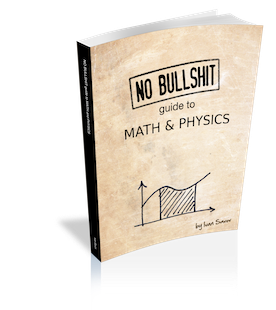The page you are reading is part of a draft (v2.0) of the "No bullshit guide to math and physics."
The text has since gone through many edits and is now available in print and electronic format. The current edition of the book is v4.0, which is a substantial improvement in terms of content and language (I hired a professional editor) from the draft version.
I'm leaving the old wiki content up for the time being, but I highly engourage you to check out the finished book. You can check out an extended preview here (PDF, 106 pages, 5MB).
About
This book contains short lessons on topics in math and physics. The coverage of each topic is at the depth required for a university-level course written in a style that is short and to the point. A motivated reader can easily learn enough calculus and mechanics from this book to get an A on the final exam on these subjects. You can learn everything you need to know in two weeks, then you will need another week to practice exercises. Three weeks and you are done.
Calculus and mechanics can be difficult subjects, but they become easy when you break down the concepts into manageable chunks. The most important thing is to learn about the connections between concepts and to understand what is going on intuitively. Every time you learn about some new concept, you need to connect it with all your previous knowledge.
Speaking of previous knowledge...
In order to get off on the right foot, the book begins with a comprehensive review of math fundamentals like algebra, equation solving and functions. Anyone can pick up this book and become proficient in calculus and mechanics regardless of their mathematical background. You can skip the first chapter if you feel comfortable with high school math concepts, though it might still be a good idea for you to do a flyover for review purposes.
Why?
The genesis of this book dates back to my days as an undergraduate student when I was forced to purchase expensive textbooks that were required for my courses. Not only are these textbooks expensive, but they are also long and tedious to read. The standard introductory physics textbook is 1040 pages long and the calculus book is another 1311 pages. I can tell you for a fact that you don't need to read 2300 pages to learn math and physics and calculus, so what is the deal? The reason why mainstream textbooks are so big is that this allows the textbook publishers to suck more money out of you. You wouldn't pay 150 dollars for a 300 page textbook now would you? The fact that a new edition of the textbook comes out every couple of years with almost no changes to the content shows that textbook publishers are not really out to teach you stuff, but only after your money.
Looking at this situation, I said to myself “Something must be done!” and I sat down to write a modern textbook that explains things clearly and concisely. The book you have in your hands.
How?
Each section in this book is like a self-contained private tutorial. Indeed, the lessons you will read grew from my experience as a private tutor. The writing is chill and conversational, but we keep a quick pace through the material. Prerequisites topics are introduced as needed. There are a lot of hands-on explanations through solved examples. We cover the same material as the 400 page textbook in just 40 pages. I call this process information distillation.
Who?
Since this is an “about” section, I will say something about me.
I have been tutoring math and physics privately for more than ten years.
I did my undergraduate studies at McGill University in Electrical Engineering,
then I did a M.Sc. in Physics and I recently completed a Ph.D. in Computer Science.
I have been developing this book in parallel with my studies and,
on the day of my graduation, I founded the Minireference Publishing Co.
revolutionize the textbook industry.
This is the deal. You give me 250 pages of your attention, and I will teach you everything I know about functions, limits, derivatives, integrals, vectors, forces and accelerations. The book which you hold in your hands is the only book you need for the first year of undergraduate studies in science.
